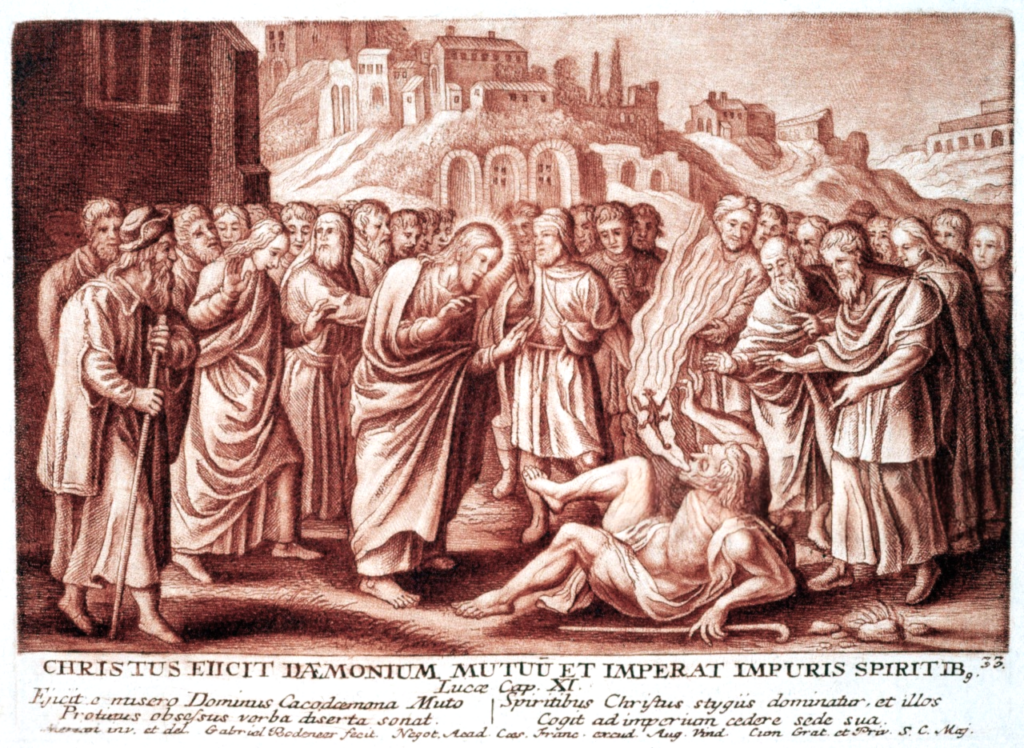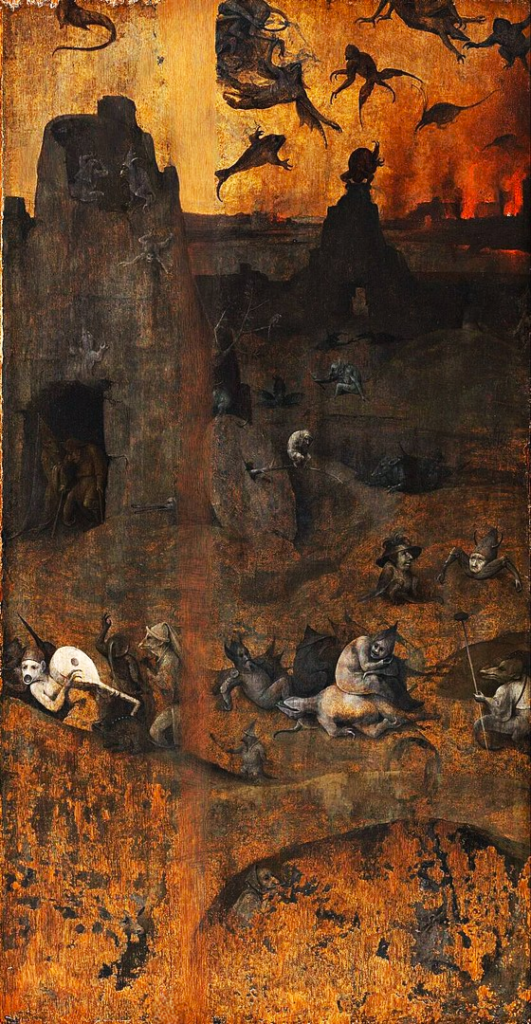Translation of the Holy Gospel According to Luke (11:14-28)
At that time Jesus was casting out a devil, and the same was dumb. And when He had cast out the devil, the dumb spoke, and the multitudes were in admiration at it. But some of them said: He casteth out devils by Beelzebub, the prince of devils. And others, tempting, asked of Him a sign from Heaven. But He, seeing their thoughts, said to them: Every kingdom divided against itself shall be brought to desolation, and house upon house shall fall. And if Satan also be divided against himself, how shall this kingdom stand? Because you say that through Beelzebub I cast out devils. Now if I cast out devils by Beelzebub, by whom do your children cast them out? Therefore, they shall be your judges. But if I by the finger of God cast out devils: doubtless the kingdom of God is come upon you. When a strong man armed keepeth his court, those things are in peace which he possesseth. But if a stronger than he come upon him and overcome him, he will take away all his armor wherein he trusted, and will distribute his spoils. He that is not with Me is against Me: and he that gathereth not with Me scattereth. When the unclean spirit is gone out of a man, he walketh through places without water, seeking rest: and not finding, he saith: I will return into my house whence I came out. And when he is come, he findeth it swept and garnished. Then he goeth and taketh with him seven other spirits more wicked than himself, and entering in they dwell there. And the last state of that man becomes worse than the first. And it came to pass, as He spoke these things, a certain woman from the crowd, lifting up her voice, said to Him: Blessed is the womb that bore Thee, and the paps that gave Thee suck. But He said: Yea, rather, blessed are they who hear the word of God, and keep it.
A Message From The Venerable Bede’s Commentary on Luke
[Luke 11:21] — When a strong man fully armed guards his own palace, his goods are in peace. By the strong man, he means the devil; and by his palace, he means the world which is set in evil, where until the coming of the Savior, he ruled with a malevolent but unchallenged authority, because he rested in the hearts of unbelievers without any opposition. Hence elsewhere he is called the prince of this world, as the Lord says: “For the prince of this world is coming, and he has nothing in me” (John 14). And again: “Now the prince of this world will be cast out” (John 12), and the reference here too is to that casting out.
[Luke 11:22] — But if a stronger man comes upon him and overcomes him, he will take away his armor in which he trusted, and will divide his spoils. He is speaking of Himself, that He would not by a deceitful harmonious operation, as some were falsely alleging, but by a stronger power, victoriously free men from the devil. The armor in which the wickedly strong man trusted are the wiles and deceits of spiritual wickedness. The spoils, however, are the men themselves, whom he deceived. These victorious Christ distributes, which is the emblem of triumph, because leading captivity captive, He gave gifts to men, appointing some as apostles, others as evangelists, these as prophets, those as pastors and teachers (Ephesians 4).
[Luke 11:23] — He who is not with me is against me. And he who does not gather with me, scatters. Let no one think that this refers to heretics and schismatics, though by extension it can be so understood, but from the context, the subject of the discourse refers to the devil, and that the works of the Savior cannot be compared to the works of Beelzebub. He desires to hold the souls of men captive, the Lord to liberate them; he preaches idols, the Lord preaches the knowledge of the one God; he draws to vices, the Lord calls back to virtue: how then can there be concord between them, whose works are divided?
[Luke 11:24] — When an unclean spirit goes out of a man, he walks through dry places. Although it can be simply understood that the Lord added these things for the distinction between His works and those of Satan, namely that He always cleanses the defiled, while Satan hurries to defile the cleansed with even graver filth, it can nevertheless also be aptly taken to refer to any heretic, schismatic, or even a bad Catholic. From the time of baptism, the unclean spirit that had previously inhabited him is driven away by the confession of Catholic faith and the renunciation of worldly ways, and it wanders through dry places, that is, the hearts of the faithful which have been purged of the laxity of fluid thoughts. The cunning adversary sees if he can fix his wicked steps anywhere there. But it is well said:
[Luke 11:24] — “Seeking rest and finding none, for, fleeing chaste minds, the devil can only find a pleasant rest in the heart of the wicked.” Hence the Lord says of him: “He sleeps under the shadow, in the covert of the reed, and in moist places.” The shadow, that is, dark consciences; in the reed, which, shiny on the outside, is empty within, being a hypocrite; in moist places, insinuating himself into lascivious and soft minds.
[Luke 11:24] — He says: “I will return to my house from which I came out.” This verse should be feared, not expounded upon, lest through careless neglect, the sin we believed extinguished in us should crush us.
[Luke 11:25] — And when he comes, he finds it swept and garnished, that is, cleansed by the grace of baptism from the stain of sins, but not filled with the industry of good works. Hence Matthew rightly says that he finds the house empty, swept, and garnished: swept, namely from past vices through baptism, empty of good deeds through negligence, and garnished with simulated virtues through hypocrisy.
[Luke 11:26] — And then he goes and takes seven other spirits more wicked than himself, and they enter and dwell there. By the seven evil spirits, he designates all vices. For whoever after baptism is seized by either heretical depravity or worldly cupidity, will soon be cast into the depths of all vices. Hence the spirits are then rightly said to be more wicked entering him. Because he will not only have those seven vices, which are contrary to the seven spiritual virtues, but also through hypocrisy, he will pretend to have those virtues themselves.
[Luke 11:26] — And the last state of that man is worse than the first. For it would have been better for him not to know the way of truth than after knowing it to turn back. This we read particularly fulfilled in Judas the betrayer, or Simon the magician, and others of the kind. But as to where this parable generally tends, the Savior himself according to Matthew explained, where, having finished it, he immediately added, saying: So shall it be also to this wicked generation. That is, what I have told about any one in particular being usually carried out, this generally continues to be carried out in the whole nation of this people. For the unclean spirit went out from the Jews when they received the law. And he walked through dry places, seeking rest for himself. Expelled indeed by the Jews, he walked through the wilderness of the Gentiles. Which, when afterward they had believed in the Lord, he not finding a place among the nations said: I will return to my former house, whence I came out. I will have the Jews, whom I had left before. And coming, he found it empty, swept, and garnished. For the temple of the Jews was empty, and did not have Christ as a guest, saying: Your house shall be left to you desolate. Because therefore they did not have the protection of God and angels, and were adorned with the superfluous observances of the Pharisees, the devil returns to them, and with the addition of seven demons, inhabits his former house and the latter state of that people becomes worse than the first. For they are now possessed by a much larger number of demons, blaspheming Christ Jesus in their synagogues, than they were possessed in Egypt before the knowledge of the law. Because it is one thing not to believe in the one to come, another not to receive him who has come. But understand the number seven added to the devil, either because of the Sabbath or because of the number of the Holy Spirit. So just as in Isaiah, over the rod out of the root of Jesse, and the flower that rises from the root, the seven spirits of virtues are narrated to have descended, so also conversely the number of vices in the devil is consecrated.



